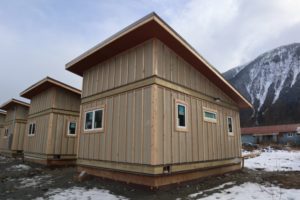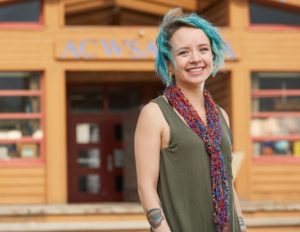Nuxalk Nation pilot project sees construction of 5 tiny houses for men on the edge of homelessness

The little houses on the Nuxalk Nation reserve near Bella Coola are nearly complete. The solar panels are in place, the drywall is being installed and the scaled-down appliances are on the way.
At 338 square feet each, the five homes sit somewhere on the scale between “tiny” and “cosy,” but Jalissa Moody hopes they’ll make a big difference in the lives of a handful of men living on the edge of homelessness.
The 28-year-old was raised on the reserve and works for the First Nation as its asset management assistant, which means she’s in charge of taking in housing applications from band members.
“I saw that there were a lot of single men that were applying,” Moody told CBC News.
But she didn’t have anything suitable to offer them.
“I could see the wide range of housing issues that we have in our Nation. I realized that our housing stock didn’t quite meet all of those needs, that we needed to be more inclusive,” she said.

Nestled amongst the mountains on a picturesque inlet at the end of Highway 20, the Nuxalk reserve is home to about 1,000 people.
That includes about two dozen single men who don’t have permanent homes.
“It’s not like they’re living out on the street, but they are couch-surfing,” Moody said.
She pitched the idea of tiny homes to Nuxalk chief and council in 2016, and they enthusiastically endorsed the funding for a pilot project.

But Moody wasn’t just thinking of housing when she started drawing up plans. She also wanted to reduce her community’s reliance on diesel generators, which are used for months every year.
“I really, really wanted to have an alternative energy source. I’m kind of a little bit of a hippy — I grew up that way,” Moody said.
The houses, built by skilled workers from the community, all have solar panels mounted on their roofs, angled south to catch the sunlight.
Inside, they each have a galley kitchen with an apartment-sized range and fridge, a small bathroom with a standup shower, and an enclosed bedroom. And overlooking it all is a pinewood ceiling.
“It was a really small space to try and get that ceiling in, so it was a learning curve for our apprentices and our guys to install that. But they did it and it looks beautiful,” Moody said.
She hopes the houses will be ready for tenants sometime in the next month.
Staff at the Nuxalk’s health and wellness program are currently sifting through their files to identify the men who are in the most need. The new residents will all sign tenancy agreements and pay rent to the Nation.
Moody’s dream is that secure housing will be a stepping stone for these men.
“I hope that the tenants will be much happier and be able to move forward in their lives, and then I hope it’ll be a first and maybe in the future we can propose to build more,” she said.


